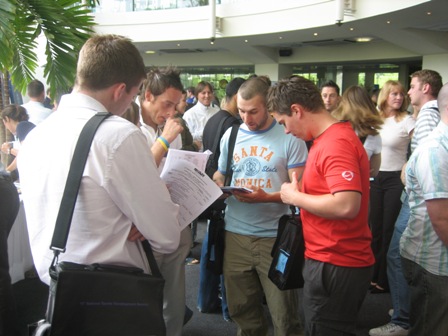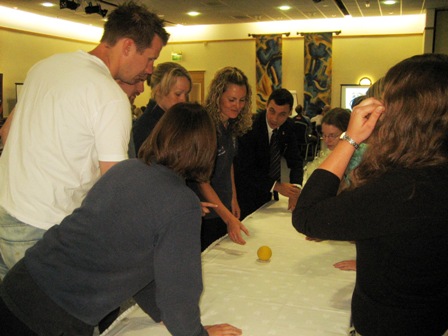The seminar's host organisation with its name in lights
Sixteen years on from its inception and with a new organisation’s name at the top of the banner, the national sports development seminar, held in Nottingham in June, was reassuringly familiar. Still here were the workshops, the information sessions, the networking, the distinctive mix of intense tutoring and informal presentations to encourage interaction and exploration. Still here was the audience of intensely enthusiastic development professionals from all levels and all interests, getting hold of what learning, experience and contacts they could as quickly as possible. Still here were the senior figures from the sport sector seeking to enliven, cajole and sometimes reassure the foot soldiers of the participation revolution.
It was something of a relief that they were still here. With ISPAL’s gradual emergence as the latest incarnation of the leisure sector’s professional body, there had been uncertainty over the new organisation’s ability to support the event and the seminar’s move from its traditional slot in the calendar to June was an indication of the serious nature of the discussions regarding the event’s future. Whoever persuaded the ISPAL hierarchy that the first achievement of their nascent organisation should not be the cancellation of a long-established and highly effective training event should have been pleased with their work. Having sampled the atmosphere as the conference theatre filled for the first keynote and the seen how the seminar works, those who were persuaded should also have breathed a sigh of thanks.
Although keynote presentations get the programme started and grab much of the attention of the casual conference observer, it is worth noting that the National Sports Development Seminar is not an event much given to conference papers from talking heads. Its popularity and longevity are based upon the workshops and information sessions that engage everyone involved in the event, whatever their background or seniority. The seminar also has a track record of iconoclasm, which puts it at odds with certain elements of the traditional conference keynote approach and at odds with some leading lights in the sporting firmament used to a more reverential audience. However, the leading lights are generally still keen to come to address what is traditionally one of the more enthusiastic and challenging audiences of their year.
In the absence of a better method of welcoming the delegates and introducing the main themes for debate, keynotes are still on the menu and, with his audience assembled after a slight delay to allow for the arrival of one of the opening acts, ISPAL chairman Peter Mann stepped into the spotlight and offered a rallying call for the sports development sector.
Having stated his sporting bona fides as someone who began his management career in a sports centre not three miles from the stage on which he stood, Mann emphasised the importance of the role of sports development professionals in the current and future structures of British sport.
“There has never been a more important time to do what you are doing,” he said. “You’re making a difference. You’re improving people’s lives.”
But, he argued, too few people are benefiting from involvement in sport and there are some massive challenges ahead. Sports professionals need to start sitting at the top table and be part of the “helicopter view” that will guide the direction of travel for national sports strategies. This, he suggested, is the job of each individual sports development professional as they build their partnerships and their communities, as well as the job of a new professional body.
Mention of the new professional body brought Sue Sutton, the recently appointed chief executive of ISPAL, to Mr Mann’s elbow, from where she was rather hastily presented to the audience. Offered the microphone for a moment, she had time to say how pleased she was to be pinning her colours to the ISPAL mast. Stating her faith in the integrity of the DCMS promise to work with ISPAL over the coming years, she hinted, possibly unknowingly, at the organisational turmoil from which ISPAL had emerged and some of the uncertainty that she faces in her new role.
Jennie Price, in post as chief executive of Sport England only since April and the star turn for whom proceedings had been delayed, demonstrated the confidence and presentational polish of someone familiar with the ministerial corridors and the workings of government policy. In her first months in post she had quickly come to understand that her job was delivery against participation targets within circumstances of tight financial controls and, while participation will be the key, she assured her audience that those fourteen- and fifteen-year-olds so crucial to the participation plan will not be forgotten by Sport England. With a detailed diagram of the Sport England view of the national sporting structure, first linear and then with various circles of influence, Price made a plea for the sharing of collective responsibility for how Sport England’s annual £250m of funding is spent.
With challenges issued and appetites for enquiry sharpened, delegates disappeared to update sessions. David Sparkes, chief executive of the Amateur Swimming Association, arrived after lunch to leave no one in any doubt as to how he thinks anyone’s money should be spent: more on pools and less on consultants. His presentation, delivered in his own inimitable style [of which more elsewhere] addressed four themes – the pursuit of gold medals, learn to swim, talent pathways and participation – and he outlined the achievements of his organisation and the challenges it faces under each heading.
Mr Sparkes suggested that key drivers for change should include a strategic plan for new pools, a radical rethink of the national facility strategy, a new management culture, better coaches and teachers and better instructors. Responding to questions, he made it clear that while he favoured investment in Olympic medals and elite performance, individual performers had to be prepared to make sacrifices if they wanted to stand at the top of the podium, even if it meant moving to Aldershot.
After delegates were allowed a couple of hours in workshops to recover, John Eady, managing director of leisure management consultants Knight, Kavanagh and Page, attempted to dispel the lingering smell of chlorine and cordite. Starting with Honda’s advertising premise of ‘what if “what if” was the new OK?’, Eady encouraged delegates to ask the questions that will challenge received wisdom in the sports development sector.
“Kids stop participating when they cross the playground from year six to year seven,” he said. “What if you question what PE teachers are doing?” Two years in the presence of PE professionals leads to a drop in participation of 25%, which suggests that something is not going particularly well in school sport.
Pacing slowly across the room in front of the platform in his best forensic manner, he probed further. “Around 70% of thirteen-year-olds have been involved with school sport. We are the most powerful intervention opportunity of any agency. What if we really understood what we were doing and why? What if we faced up to our image problem? One third of thirteen-year-old girls don’t want to get involved with sport because they get hot and sweaty. One third didn’t have anyone to go with. Think about kids in groups, in cohorts... What if we were really sophisticated about how we recruit our volunteers? Some of them are bloody awful!”
Challenging the accepted routes and methods is, Eady argued, an important facet of effective sports development and he challenged the audience to recognise that quality of thought was an essential skill. “Too many people are prepared to swallow the bollocks spewed out by national agencies,” he said. “My message to you is don’t just follow: lead!”
Other keynotes picked up this theme. Dr Mark Nesti, a reader in sport psychology at York St John University encouraged sports development professionals to recognise that, as more strategies, initiatives and plans were imposed, the more important the role of the individual becomes: stuff the initiatives, make a personal decision and take responsibility. Stewart Kellett, regional director of Sport England North West, urged everyone to grab the opportunity offered by the Olympics. The impact of the Olympics will be one hundred times bigger than that of the Manchester Commonwealth Games, which itself was a real boost for sport in the North West. He urged everyone to avoid getting distracted by the negativity and make sure that they are ready to make the most of what will be a unique moment in British sport. Peter Hirst from England Squash explained in detail the development and delivery of elite performance from the perspective of a governing body.
After two days of keynotes, workshops, intelligence updates, ‘added value sessions’, soapbox sessions, the inevitable networking and the potentially challenging seminar dinner, it fell to Steve Bradley, head of sport, arts and tourism at Nottinghamshire County Council, to bring provide delegates with a coherent and considered summary. Starting with a selection of vowels and consonants, he considered the role and responsibilities of national governing bodies and their officers to promote and support their sports. Being blunt to the point of insensitivity was, he suggested, not always the best approach to the task of recruiting more of the public and more of the leisure profession to the pursuit of participation.
Although concerned by the absence of a helicopter, never mind a helicopter pilot, in Jennie Price’s diagram of the sporting nation, Bradley reminded his audience that sport is a powerful medium, powerful enough to make his mum miss bingo when Kelly Holmes was running in the Olympic final and to make a councillor hug an officer when the 2012 Olympics venue was announced; both were shocking experiences, with the latter still leaving a mental scar. The survey of the seminar’s delegates proved positive, with 75% saying they were getting sufficient continuing professional development and 78% of these saying it came from their employers; 60% said there was a good chance that they would still be working in the sports development field in 2012 and only 1% agreed with the statement “We’re all doomed”, a significant improvement on previous year’s surveys on both counts.
He urged sports development officers to have faith in the creativity and motivation of the sports development network that he had witnessed over the past few days. “You don’t know how many people are waiting for your influence,” he said. “Despite the system we have a huge opportunity to some brilliant work on the ground. The new white paper on place-making and communities means that this is your time but don’t forget why we do it.”
Thankful that Mr Bradley had used only Carol Vorderman’s format and not her dress, Bev Smith brought the seminar to a close and wished the world of sports development good luck until next year.
The National Sports Development Seminar
The National Sports Development Seminar brought its unique mixture of intense workshops and boundless enthusiasm to the East Midlands Conference Centre in Nottingham again this summer. Jonathan Ives took a seat in the front row and paid attention
The seminar's host organisation with its name in lights

